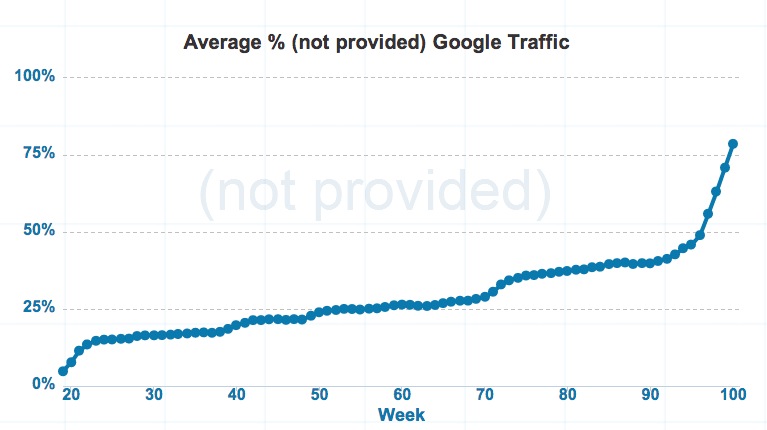

For coming up to 2 years, digital marketers have been annoyed at Google for removing keyword data from their web reporting. While it has been a slow increase in the amount of data affected, it was something that you could live with as a marketer. For the most part, you could sample the rest of your reporting to get a picture of what the (not provided) keywords were. Recent changes by Google have sent the percentage of Not Provided numbers soaring however. Some estimates report an average of nearly 74% of keywords are ‘not provided’ across different verticals.Without this keyword referral data, our tasks as Internet marketers become far more difficult—but not impossible.This isn’t a new issue; the ‘not provided’ bucket has been growing for a while. What’s annoying of course is the reduced (leading to no) visibility of actual phrases resulting in referral traffic from Google.com.

What are search marketers to do without their beloved Google organic keyword data? Well, it doesn’t help in quantifying SEO goals especially across multiple SEO targets and themes. We’re left to estimate, which doesn’t help in quantifying results. Rock and hard place anyone? Sampling has gone out the window from the time we hit the 100% mark. So, we will be left to rely on looking at interconnecting multiple data sources to attempt to understand what is going on.Here are some initial thoughts on ways to continue to understand keyword data without Google sharing it directly:
- Keyword ranking data with good old-fashioned manual searches – if a site ranks in the top organic positions for a competitive, unbranded, high volume keyword then it can be assumed that is a contributor to your organic search traffic visits
- Google Organic Landing Page traffic volume – if a page ranks well for a specific keyword and the page also receives loads of referrals visits from Google organic search, then we can extrapolate that the keyword targeted on that landing page is sending organic traffic
- Google Insights & Webmaster Tools – not the end all, be all, however they will provide us with keyword trends
- Google Adwords Keyword Tool – we can understand the volume of search traffic for a keyword and help us continue to grow our keyword strategies for both paid and organic
- We can use Google Adwords for keyword research and to understand whether our combined search efforts are directly impacting search traffic growth or whether the brand awareness is simply growing through all efforts
It can’t be ignored that Google wants us marketers to spend more money in order to have keyword level data. This is the final transition to a search world where we have to look at combined search and not just paid or organic. With the transition to 100% secure search we have to take a holistic approach and understand that paid and organic are working together on a combined front – as they always have done.Although it won’t be simple, we’re hopeful that our combined search effort and use of multiple data sources will allow us to continue providing valuable website data, and more importantly we can keep doing what we know best – driving traffic and revenue for our clients.And hey, at least Bing and Microsoft are still happy to provide us with keyword data!






